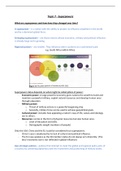Summary
Summary A level Pearson Edexcel Geography year 2 notes (Human Systems and Geopolitics) Topic 7: Superpowers
- Module
- Unit 1 - Dynamic Landscapes
- Institution
- PEARSON (PEARSON)
Detailed notes for revision regarding the (Human Systems and Geopolitics) Topic 7: Superpowers, A level geography course. Overview: Superpowers can be developed by a number of characteristics. The pattern of dominance has changed over time. Superpowers and emerging superpowers have a very signif...
[Show more]





